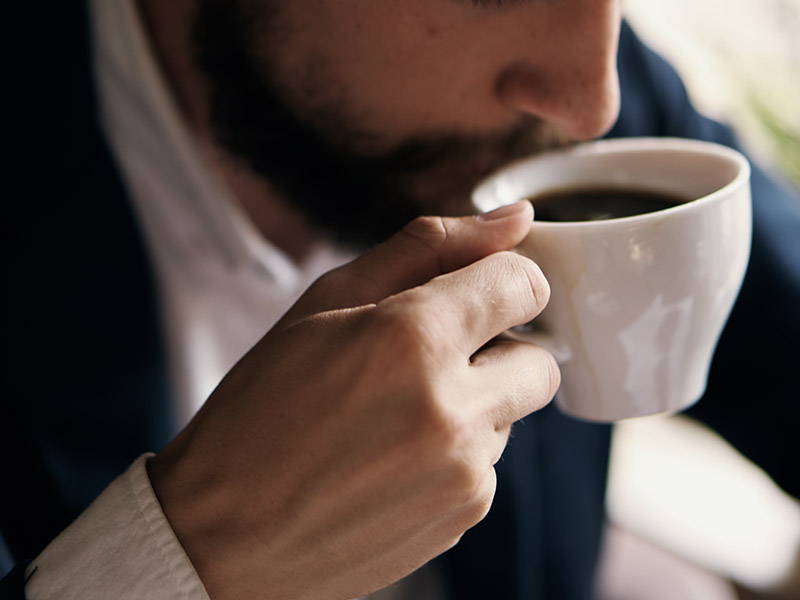
Caffeine Withdrawal Side-Effects & FAQs
Key Takeaways
- Using caffeine in some form can cause a dependency or addiction, making it hard to stop.
- Most people get an energy boost but some can have negative effects for caffeine. Tremors, anxiety, and insomnia are all indicators or caffeine dependency.
- Halting caffeine consumption can cause withdrawal effects including headache, nausea, and many more.
Caffeine is a well-known stimulant that is used widely by people all over the world. As much as 90% of Americans drink coffee, tea, or consume caffeine in other ways.
Consuming caffeine regularly can cause dependency and even addiction, even if it’s just a cup of coffee a day. You may wonder if coffee is bad for you, and the answer is that it can be. The FDA considers caffeine to be generally safe and uses it as a drug and food additive.

However, caffeine can have negative effects on blood pressure and cause anxiety, tremors, and insomnia. If you think you may have a caffeine dependency, there are ways to withdraw safely from its grasp.
According to a study by Johns Hopkins researchers, caffeine withdrawal is a recognized disorder. It’s commonly called caffeine withdrawal syndrome, and the severity of symptoms varies.
Typically, the more you consume and the longer you’ve been using caffeine, the worse your symptoms of withdrawal.
Today, we discuss:
- The signs and symptoms of caffeine withdrawal
- The length of these symptoms
- Assessing if you have caffeine withdrawal syndrome
- How to stop symptoms of caffeine withdrawal
What are the Signs and Symptoms of Caffeine Withdrawal?
When your body goes into caffeine withdrawal, you may experience one or more of these signs and symptoms.
1. Headache
A headache is the most common symptom of caffeine withdrawal.
When caffeine is introduced into the brain, it constricts the blood vessels, slowing blood flow. If caffeine consumption is normal, then the brain gets used to this restriction and works to counteract it.
But when you no longer consume caffeine, the cerebral blood flow goes back to normal. This increase in blood flow can cause a headache. The amount of time and length of the headaches will vary by how much caffeine you normally consume and how long.

One study set out to quantify the amount of blood flow restricted for the average person. Researchers divided up 45 participants into groups of low consumption, medium, and high.
They gave each person either a placebo or 250 mg of caffeine, then had their brain mapped. The data and images suggest the average person’s blood flow is reduced by as much as 27 percent.
How do you get rid of a caffeine headache? The best thing to do is stay hydrated and let time do its thing. Your brain will adapt to the increase in blood flow and the headache will subside.
Interestingly enough, caffeine is used in combination with certain medications to enhance their benefits. When given 100 mg or more of caffeine along with over-the-counter migraine medications, users found greater relief from migraine headaches.
2. Lack of Concentration
Caffeine is commonly used to boost concentration, focus, and remove jitters before a big presentation or event. Consuming caffeine will increase adrenaline, dopamine, and norepinephrine to stimulate the brain and bring alertness and focus.

However, when reducing or eliminating caffeine, your body and brain may struggle without its caffeine fix. This can cause you to lack focus, clear-headedness, and reduce levels of concentration.
If you notice things like struggling to focus, concentrate, and general brain fog, caffeine withdrawal could be the cause.
3. Fatigue
Most often, caffeine is consumed by drinking coffee, tea, energy drinks, or sodas in the morning. The caffeine provides a boost in alertness, reducing fatigue by blocking adenosine neurotransmitters.
When reducing or eliminating caffeine, fatigue is a common symptom, especially during the day. Daily consumers of caffeine tend to have this symptom more than non-daily users. Studies show that daily users can see fatigue effects within 12 hours, with the average being 16 hours.

If you notice more fatigue or drowsiness during the day after removing caffeine, try getting more sleep at night. This can help keep you more alert until the effects of the caffeine withdrawals are over.
4. Constipation
Many coffee lovers notice the laxative effects that caffeine has on them. Caffeine stimulates movement along the intestines and colon, moving food and waste through the GI tract.
When eliminating coffee or other forms of caffeine, mild constipation may occur. If this happens to you, try eating more fiber-rich and nutrient-dense foods and drink more water to stay hydrated.
Here are some ideas for high-fiber foods:
- Oats
- Quinoa
- Barley
- Green peas
- Broccoli
- Raspberries
- Pears
- Apples
- Chia seeds
- Split peas
- Lentils
- Black beans
Incorporating more of these in your diet can greatly help constipation issues.
5. Nausea and Stomach Upset
Another symptom of caffeine withdrawal is nausea. Some may just feel like they have an upset stomach while others will vomit.

All these symptoms can happen as your digestive system expels the remaining caffeine in your system. Some may have symptoms for a month or longer, while others may have symptoms for just a few days.
Be sure to drink plenty of water and electrolytes to stay hydrated and to help settle your stomach. You may also take over-the-counter medications to relieve these symptoms, which sometimes come with headaches.
6. Anxiety
Caffeine can cause anxiety symptoms in some, while caffeine withdrawals can cause it in others. This can also feel like jitters or feelings of nervousness.

Once your body and brain are dependent on caffeine, the lack of it can cause anxious feelings. Combined with sugar, like in energy drinks and sodas, caffeine withdrawal can also cause panic attacks.
Reducing caffeine levels gradually over time can lower the risk of anxiety from caffeine withdrawal.
7. Depression
Adenosine not only improves focus and alertness, it can also elevate your mood. Caffeine can have the same effect; just look at all the frowns turned into smiles as someone’s handed their first coffee of the day.

An extensive study of over 50,000 women illustrates the fact that regular caffeine consumption can reduce depression. The women did a baseline questionnaire and then did follow-ups over the next 10 years. Those who drank four or more cups of coffee regularly had a 20% lower risk of depression than those who drank a cup or less.
Now, take away the caffeine and you shouldn’t be surprised that some will feel depressed. Lack of energy and reduced mood are common when withdrawing from caffeine.
If you’re withdrawing from caffeine, expect your mood to take a hit for a short time. If things don’t level out within a few weeks, it may be time to speak with a doctor.
8. Irritability
Just like caffeine withdrawal can alter your mood, it can cause you to be more irritable. Just think of all those unhappy coffee drinkers and how much better they feel after their first morning drink.
Caffeine can start to wear off in just a few hours, so it makes sense that some are more cranky first thing in the morning. Once the caffeine hits, their mood gets better, and the irritability goes away.
In fact, withdrawal symptoms such as irritability and lack of focus cause the large majority to consume caffeine again. While these symptoms aren’t fun to deal with, it may be unavoidable if you want to eliminate caffeine dependence.
Just like reducing depression symptoms, gradually weaning off caffeine may be best to reduce irritability.
How Long do Caffeine Withdrawals Last?
The average amount of caffeine consumed by Americans is 280 mg per day. This is equivalent to about two cups of coffee or up to five soft drinks. The accepted safe level of daily consumption is no more than 400 mg, or:
- Four cups of coffee
- Two energy drinks
- Up to ten cans of soda
The length of time you may deal with caffeine withdrawals after quitting varies. The longer you’ve been consuming caffeine, the longer it can take to no longer feel withdrawal symptoms.

Expect caffeine withdrawals to start within 12 hours of reducing or no longer consuming it. Symptoms can last up to nine days before your body and brain adjust to the removal of caffeine.
Risk Assessment for Caffeine Withdrawal Syndrome
If you’re wondering about symptoms and think you might be dealing with caffeine withdrawal syndrome, you can get a risk assessment.
To do this, you’d make an appointment with a doctor. They will do a physical exam and get a thorough history, including all medication, supplements, and stimulant use. This is done to rule out any other possible conditions that could cause similar symptoms.

Once other issues are ruled out and symptoms are considered, a doctor should be able to determine the cause. Here are just a few health concerns that will need to be ruled out:
- Anxiety disorder
- Chronic fatigue
- Depression
- Infection
- Other sources of headaches, including migraines
Once you’ve got a diagnosis, there are a few things you can do to reduce or eliminate caffeine withdrawal syndrome symptoms.
How Do You Stop Caffeine Withdrawal?
If you plan to stop consuming caffeine, you may want to consider preparing for caffeine withdrawal syndrome. The higher the amount and longer you’ve used caffeine, the more likely you’ll have withdrawal effects.
Here are a few ways you can stop or reduce caffeine withdrawal:
Reduce caffeine consumption over time. Heavy caffeine users will have the most symptoms of caffeine withdrawal. In order to kick caffeine dependence for good, gradually reduce consumption over time to help your body and brain get used to lower limits.
Cut the caffeine. Another strategy is to introduce decaffeinated beverages. Drink your coffee half-strength by drinking half decaf mixed with full-strength coffee. Increase the number of decaffeinated beverages as you reduce the caffeine. You could also replace coffee with decaffeinated herbal tea.

Get more sleep. If you aren’t getting the recommended seven to nine hours of sleep, start making it a habit. Getting more sleep and rest in general can reduce fatigue and other caffeine withdrawal symptoms.
Treat the symptoms. Headaches, nausea, and vomiting can be controlled with over-the-counter medications. Constipation can be resolved by including more fiber and nutrient-dense food in your diet.
Exercise more. Another way to reduce caffeine withdrawal symptoms is to get more exercise. It will keep your mind off your symptoms and also promote more blood flow to the brain and muscles. More exercise will also boost your energy, reducing fatigue and brain fog.
Drink more water. Dehydration can reduce cognitive performance, exacerbating caffeine withdrawal symptoms. Make sure you are staying adequately hydrated to keep your blood, organs, and bowels flowing.
Final Thoughts
Caffeine is considered a stimulant, and long-term use can cause physical and psychological dependency. Regular caffeine consumption can affect dopamine, norepinephrine, and glutamate, which are mood-altering neurotransmitters.
Many people start using caffeine as a pick-me-up to reduce drowsiness and fatigue. Caffeine stops the effects of the neurotransmitter adenosine, which causes these symptoms.
When reducing or eliminating caffeine dependency, some may have withdrawal symptoms. The longer and heavier you’ve been consuming caffeine, the more severe your symptoms can be. This is called caffeine withdrawal syndrome.
Caffeine withdrawal symptoms can include low energy, brain fog, and fatigue, which can make working out difficult. Vintage Bliss was designed to provide a better night’s sleep and combat many of the symptoms found in caffeine withdrawal.
Do you consume caffeine on a regular basis? Have you dealt with any of the caffeine withdrawal symptoms mentioned today? We’d love to learn any tips you have for reducing symptoms in the comments below.









